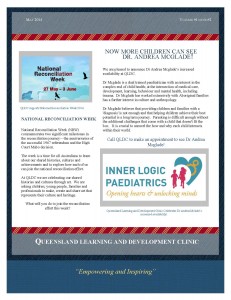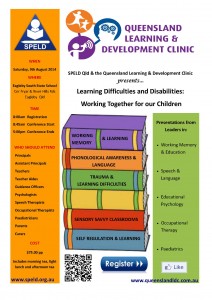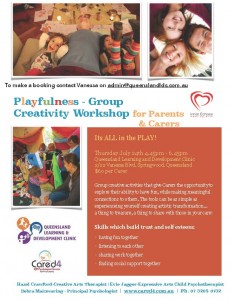Introducing Our Extremely Talented Art Therapist
/0 Comments/in Child Protection News /by PeterHazel Crawford is an Experiential and Creative Arts Therapist and Community Arts facilitator of over 20 years experience working multi-modally in various settings, with children, adolescents and elders. Her innovative form of practice is based on a strong collaborative ethic, tailored to suit the specific needs of the individuals, communities and organisations she works with.

QLDC Newsletter Vol 1 Issue 2
/0 Comments/in Child Protection News, Practice News /by Principal PsychologistA special Event for Teachers, School Professionals, Parents, Students
/0 Comments/in Child Protection News /by Principal PsychologistNew Workshops Available – Book Now!!
/0 Comments/in Child Protection News /by Principal PsychologistWelcome to another fabulous team member!
/0 Comments/in Child Protection News, Workshops /by Principal PsychologistHazel Crawford is an accredited and experienced Creative Arts Therapist who is now available to offer school based and clinic based programs.
Hazel is a Creative Arts Therapist (MIECAT M.A.) and community arts facilitator with over twenty years experience working multi modally across various settings. Her work has spanned a range of applications including facilitating a highly successful art and drama programs in the Adult Disability field (for which she received the David Helfgott Award in 2006); running several therapeutic projects for bush fire affected primary school children in regional Victoria (in response to the Black Fires of 2009) as well as tailoring a range of therapeutic projects and programs for disabled adults, the aged, youth at risk and for a drug and alcohol rehabilitation service. Hazels’ therapeutic approach is attuned to the specific needs of the individuals and groups worked with, bringing her deeply experiential knowing that art making supports inquiry into meaning, and is a safe dynamic place for expression and transformation.
The Effects of Neglect on Child Development
/0 Comments/in Child Protection News /by Principal PsychologistWondering whether or not to keep your child back a year in school?
/0 Comments/in Child Protection News /by Principal PsychologistReasons given for placing pupils outside their chronological age group.
The rationale for placing pupils in a year group other than their chronological age group tends to be as follows:
(i) the pupil has exceptional intellectual skills and is isolated as a learner in their present peer group and presents major difficulties for teachers in terms of providing appropriate curriculum extension;
(ii) the pupil has exceptionally delayed intellectual skills and cannot productively engage in group learning tasks and presents teachers with major difficulties in curriculum differentiation;
(iii) in association with (ii) the pupil is very delayed emotionally and cannot make adequate relationships with their peer group, is at risk of isolation and possible bullying;
(iv) the pupil is very young for his/her year group i.e. a late summer birthday and may be immature or delayed in learning
(v) a pupil may have missed a substantial part of a year through illness or other reasons;
These reasons are frequently linked with strong parental preferences for their child to be placed in an alternative year group.
(ii) and (iii) of the above reasons are particularly significant at the point of phase transfer (Kindy/Prep to Year 1, end of Primary to Start of Secondary) where the demands of the next phase are perceived to be too onerous for the pupil to cope with.
Best practice guidance
Effective practice is based upon a child’s entitlement to be educated alongside their age equivalent peers. The responsibility for addressing individual needs lies with the school through an appropriately differentiated/enriched curriculum. For further information in this area see the National Curriculum Inclusion Statement – web links at end of document)
- It will only be in exceptional circumstances that a pupil moves out of her/his chronological age group. In no instance should this be more than a single NC year. Schools should take steps to ensure that curriculum entitlement is not compromised.
- For a pupil to move up a year, schools should satisfy themselves that the following apply:
- the pupil’s emotional and social maturity is sufficient to establish positive peer relationships with an older age group
- the pupil demonstrates exceptional intellectual skills and achievement in all subject areas
- there has been full exploration of curriculum extension/enrichment possibilities
- the pupil has physical maturity sufficient to meet the curriculum and personal/social demands of a higher NC year
- there is parental support and agreement
- there is pupil support and agreement following extensive explanation and counselling as to the implications
- there are action plans in place to manage phase transfers and examinations
For a pupil to stay down a year, it would be expected that they would be the subject of an Individual Education Plan (IEP). The most recent review meeting should record the evidence which underpins any decision to move a pupil out of chronological age group.
Schools and involved professionals should satisfy themselves that the following apply:
- the pupil shows a significant delay in emotional development and social skills appropriate for a younger peer group
- the pupil shows significant delay in intellectual development/educational skills across the subject areas, to an extent that it is not reasonable to expect curriculum differentiation to be successful
- the pupil’s physical maturity does not make them developmentally different from their new peer group
- there is full parental support and agreement
- there is pupil support and agreement following explanation and counselling at a level the pupil is able to understand
- there are clear objectives and time scales to the change with action plans in place to manage phase transfers and examinations if appropriate.
The pupil should not be expected to remain out of chronological age indefinitely. Any move out of the chronological age is expected to be managed within a phase i.e. at the end of a phase the pupil should be placed within their chronological age group.
DJM Psychological Services can partner with you and the school in reaching the best outcomes for your child.
Holiday Season
/0 Comments/in Child Protection News /by Principal PsychologistToday was our last working day for this year.
Thank you for your loyalty.
We look forward to supporting you in 2014.
We will be offering sessions from January 6th.
Keep safe.
Merry Christmas and a Happy New Year
/0 Comments/in Child Protection News /by Principal PsychologistInteresting links
Here are some interesting links for you! Enjoy your stay :)Quick Links
Categories
- Accommodation locally
- Book Launch
- Champion A Child's Therapy
- Child Protection
- Child Protection News
- Children of Parents with a Mental Illness
- Community and Society Issues
- Conference
- Culture
- Educational & Developmental Issues
- Empowering Parents
- Motivation
- portfolio
- Practice News
- Professional Development Attendance
- Wellbeing Activities
- Wellbeing Australia News
- Workshops







